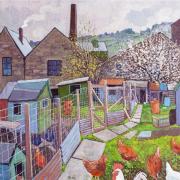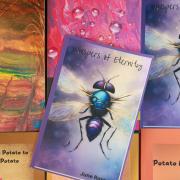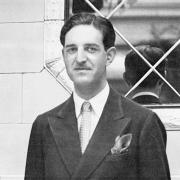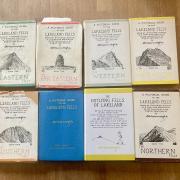This month marks the 75th anniversary of Operation Pied Piper which saw more than 3.5million people evacuated from cities around Britain to escape German bombs. Six-year-old Ray Evans was one of them and this is his story

It was September 1939, and war had just been declared against Adolf Hitler. We made our way through the streets of Liverpool to Lime Street Station, on our way to South Wales to escape the bombing that was sure to come. People came out of their homes to wave and shout goodbye to the city’s children. I asked my mother, who was following alongside, why some of them were crying, but she didn’t answer.
Most of us younger children, five and six years old, had no comprehension of what was really going on that day. We had no idea our country was at war with Germany. Quite a few of the 600 children being evacuated from our school that day, were even carrying buckets and spades, thinking they were going on a day-out to the seaside, their mothers unable to bring themselves to tell the truth.
There were thousands of people at the station, all pushing and shoving trying to board the train – children screaming and crying, not wanting to leave their mothers. There were people walking over food and clothing that had fallen out of bags and pillowcases the younger ones were struggling to carry. Mum said she’d never seen anything like it: ‘Half the population of Liverpool must be here.’ We finally got to our carriage just in time to hear the porter shout: ‘All aboard!’
Mum’s eyes filled with tears as she quickly held each of us in her arms. I’d never seen my mother cry before. She told us to be brave and to look after each other. She then gave George, my eldest brother, 13, a sixpence and told him to buy us some cocoa on the way.
For many it was to be an adventure they would never forget. But for others, including myself, it would be a traumatic experience that would stay with me for the rest of my life.
It was only a couple of months before the war that we moved from our cramped little house in the suburbs of Norris Green to a neat new home with the miracle of indoor plumbing. Mum, Dad, me and my four brothers and four sisters were all happy there but then, in school assembly one morning, the headmaster stood up and brought immediate silence by stamping his foot hard on the stage floor.
He said he was giving each of us a letter for our parents, because there was going to be a war and we were all being sent off to Wales. The letter contained a list of all the clothes we would need, as well as sandwiches, biscuits and an orange for the journey.
When we got home from school with that letter, I could tell my mother was frightened, but she tried her best not to show it. Dad was still at work. ‘It’ll only be for a few weeks,’ she told us. Then she threw herself into a frenzy of arrangements. With a small boy’s innocence, I wasn’t frightened, but so excited at the prospect of my first train journey. I could hardly wait for our departure!
When the day arrived, Dad woke us at 6.30am and helped us pack, while Mum cooked a big bowl of porridge for our breakfast. Stanley, Dorothy and Edith, my three younger siblings, were fast asleep in their beds. Then it was off to school, where the teachers lined us up in twos in the playground and told us to hold hands. Elsie held mine.
‘Remember, you must carry your gas mask at all times, no matter where you are,’ the teachers told us. ‘Even when you go to the toilet.’
I had just turned six and was far too young to take seriously Adolf’s Hitler’s promise to gas us all, even in the toilet, so I put my hand over my mouth and tried not to laugh.
At 11pm, after an exhausting 12-hour journey, we finally arrived at Llanelli Station in South Wales, and spilled out onto the platform. Liverpool seemed a million miles away. Local volunteers took us to a school hall that had a big sign on the door saying, “Evacuee Distribution Centre”. We were each handed a brown paper bag containing two cheese sandwiches.
The allocation of children to their foster parents was like a cattle market, a terrible moment that would be burnt into my memory forever. It was just as well our mother wasn’t there to see people mulling us over, saying things like: ‘I’ll have that one’ or ‘No, I don’t want a boy, I want a girl’.
She’d given strict instructions about us sticking together with George and Elsie, the eldest, sharing the little ones between them. Being that I was the youngest, she’d insisted I stay with Elsie, but the billeting officer told her it was against the rules. Elsie and my sister Muriel were packed off together with a white-haired lady, while I was left with my brother Frank. When no one had picked us, we were left standing there after all the other children had been placed, but we were assured a home had been found.
In hindsight, our new landlady, Mrs Jones, gave us fair warning that we weren’t welcome or wanted. Although she had said she was willing to take two boys, she hadn’t bothered to come to the distribution centre. Through a mix-up, we were sent to the wrong address. Two weeks later, the billeting officer finally delivered us to Mrs Jones, her welcome was almost Artic in its frostiness.
The billeting officer had to tap Mrs Jones on the shoulder to get her attention, as she polished the brass knocker on her front door. Mrs Jones turned round, ignored the billeting officer’s outstretched hand and stared straight at Frank and me with an expression that chilled us to the bone. She didn’t say a word. And when she had finished looking us up and down with her steely cold eyes she turned her back on us and returned to her polishing. ‘Take them round the back and leave them in the kitchen,’ she said. ‘I don’t want them dirtying my front step.’
During the next six years, I was billeted in several different homes, with people who were often mean and nasty, and a few who were wonderful for their kindness and generosity. It was not until 1945, that I was reunited with my own family in Liverpool. But that happy reunion took place in a city that had been bombed to ruins, leaving many of us homeless, again.
Extracted from ‘Before The Last All Clear’ by Ray Evans. Order the book and read two free chapters of his latest book ‘All I Want Is A Peaceful World… And A Pork Pie’ online at beforethelastallclear.com.



























